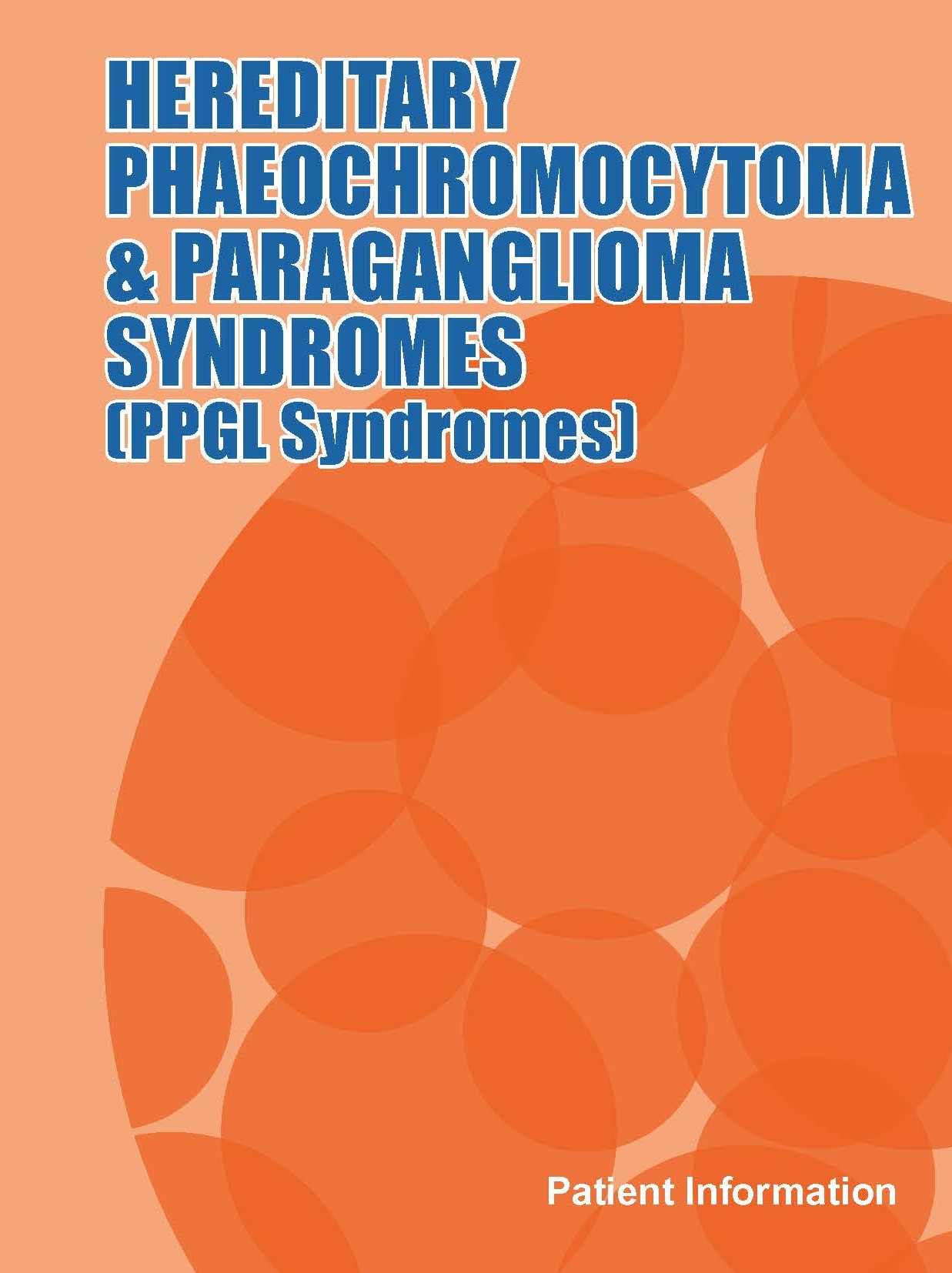What are PPGL Syndromes?
PPGL syndromes are conditions that may cause tumors called paraganglioma or phaeochromocytoma. These syndromes are caused by gene changes (mutations) that can be passed down in families. Sometimes the tumors may make greater than normal amounts of hormones, the body’s chemical messengers, which in turn may cause a range of different symptoms. These tumors grow in particular cells of the body that mean that they are classed as neuroendocrine tumors or neoplasms (NET or NEN). All the tumors in PPGL syndromes can occur alone (sporadic) and separately from an inherited syndrome.
A person may be diagnosed with an inherited PPGL syndrome after being offered a gene test. Genetic testing may be offered either after someone is diagnosed with a paraganglioma or phaeochromocytoma, or because there is a family history of a PPGL syndrome. In this way, some people may be diagnosed with a syndrome before they have developed any tumors. In addition, some people diagnosed by gene test with a syndrome may not actually develop any tumors in their lifetime.
How are PPGL Syndromes Diagnosed?
A person may be diagnosed with an inherited PPGL syndrome after being offered a gene test. Genetic testing may be offered either after someone is diagnosed with a paraganglioma or phaeochromocytoma, or because there is a family history of a PPGL syndrome. In this way, some people may be diagnosed with a syndrome before they have developed any tumors. In addition, some people diagnosed by gene test with a syndrome may not actually develop any tumors in their lifetime.
Table 1: risks of tumors in unaffected individuals with gene mutations
Gene Risk of any tumour (lifetime) Most likely position of tumor Multiple tumors Other tumors (not PGL / Phaeo) SDHB 25-30% Adrenal and extra adrenal PGL 30% Renal cell carcinoma GIST
SDHD 80-90%* Head and neck 50% SDHA less than 10% Adrenal and extra adrenal PGL rarely GIST SDHAF2** 5% Head and neck 90% Not reported SDHC 10% MAX* 30-50% Adrenal 60% Not reported TMEM127* 40-80% Adrenal 25% Not reported * If inherited from the father
** Data is limited as numbers of cases are small and therefore the tumor risks are likely to be overestimates
Regular Screening in PPGL Syndromes
After any initial treatment has been done, anyone with a PPGL gene change (and therefore a PPGL syndrome) should enter a long-term screening programme. In this way, any other tumors should be found earlier before symptoms occur. This should also make treatment easier. The programme would be similar for people who have already had treatment, and for those who are not yet affected (and may not be affected during their lifetime).
Gene Recommended surveillance SDHB - Annual hospital appointments and blood tests·
- Abdominal imaging* at baseline and if normal every 12-24 months
- MRI/CT neck, chest at baseline and if normal every 3 years
SDHD - Screening should only be offered to patients who have a gene change passed down from their father.
- Annual hospital appointments and blood tests
- Abdominal imaging* and MRI/CT neck, chest at baseline and if normal every 3 years
SDHC - Annual hospital appointments and blood tests
- Abdominal imaging* and MRI/CT neck, chest at baseline and if normal every 3 years
SDHA - Annual hospital appointments and blood tests
- Abdominal imaging* and MRI/CT neck, chest at baseline and if normal every 3-5 years
SDHAF2** - Screening should only be offered to patients who have a gene change passed down from their father
- Annual hospital appointments and blood tests
- Abdominal imaging* at baseline and if normal every 3 years
- MRI of neck, chest at baseline and if normal every 5 years
MAX** - Screening should only be offered to patients who have a gene change passed down from their father
- Annual hospital appointments and blood tests
- Abdominal imaging* at baseline and if normal every 3 years
- MRI of neck, chest at baseline and if normal every 5 years
TMEM127** - Annual hospital appointments and blood tests
- Abdominal imaging* at baseline and if normal every 3 years
- MRI of neck, chest at baseline and if normal every 5 years
*MRI is the preferred method of screening but CT may be required in some instances if MRI not tolerated or unavailable.
Where to find more information and support
For Pheo Para Syndromes, we recommend contacting the Pheo Para Alliance, based here in the US.
- Website: https://pheopara.org/
- Contact: https://pheopara.org/contact
In the UK, visit www.phaeoparasupport.org.uk
-
Hereditary Phaeo Para Syndromes (UK)

UK information booklet on pheo para syndromes (2020)
Click here to download (PDF)
Author: Jo Grey, AMEND CEO, with the help of the AMEND Medical Advisory Team